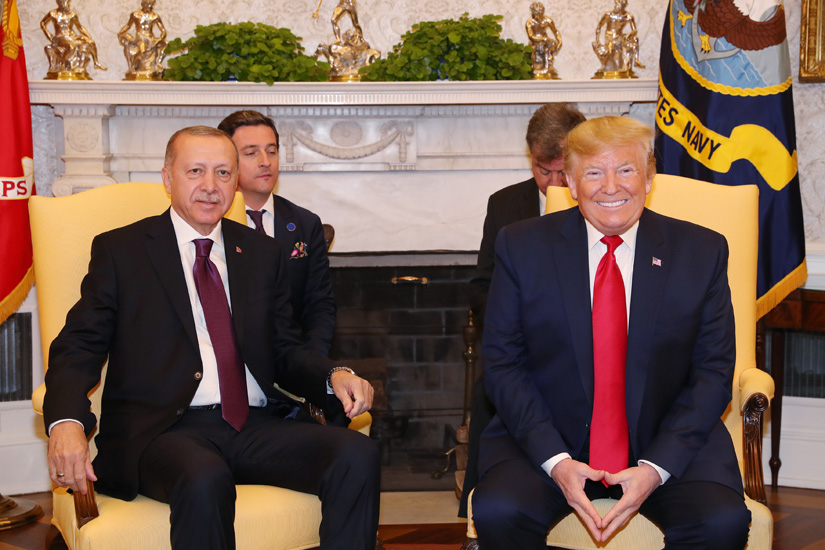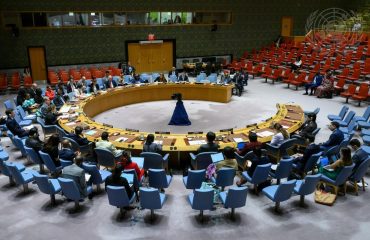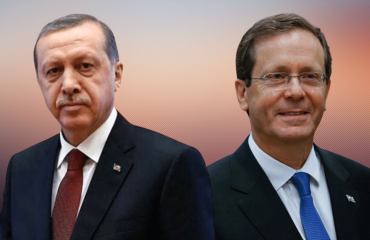

A White House memory from Turmp’s first term. The second term could bring risks and opportunities for Erdoğan and Türkiye.
With Donald Trump announcing his victory in the US presidential race, Türkiye is closely watching developments in Washington. Turkish President Recep Tayyip Erdoğan was among the first leaders to congratulate him. Trump’s first term was marked by an unconventional foreign policy that often relied on pragmatism and unexpected maneuvers, which led to a volatile relationship with Türkiye. His second term may be just as transformative, potentially impacting core areas of Türkiye-US relations and testing both countries’ diplomatic flexibility on issues ranging from security to regional influence.
Syria and the PKK
Syria remains a central and complex issue in Türkiye-US relations. In Trump’s first term, his repeated promises to withdraw American troops from Syria raised hopes in Ankara, yet these promises were only partially fulfilled. The US continues to support the YPG, a group Türkiye considers a national security threat due to its links with the PKK. Washington’s supply of arms and resources to the YPG is perceived by Türkiye as indirect support for terrorism.
In Trump’s second term, Türkiye’s most pressing expectation is for the US to end its backing of the YPG and to complete its withdrawal from Syria. However, the US has strategic interests in the region, particularly concerning control over oil-rich areas in northern Syria, making a complete pullout unlikely. The continuation of American support for the YPG or its presence in Syria could further strain relations, forcing Türkiye to consider more independent security maneuvers in the region.
The S-400 and F-35 crises
Türkiye’s decision to purchase the Russian S-400 missile defense system triggered a significant crisis in its relations with the US. During Trump’s first term, Congress pressured his administration to impose sanctions on Türkiye under CAATSA, leading to Türkiye’s removal from the F-35 fighter jet program. Türkiye defends its purchase as a sovereign decision, asserting its right to meet its own defense needs independently of NATO allies.
The path forward in Trump’s second term is uncertain. Will he lift sanctions, or will he face continued pressure from Congress to maintain a hard line? Türkiye has responded to these sanctions by expanding its investments in domestic defense industries, aiming to reduce dependency on the US by developing indigenous fighter jets and defense capabilities. How Trump navigates this crisis will be a key factor in determining the future of military cooperation between the two nations.
FETÖ and the Brunson crisis
For years, Türkiye has been pressing the US to extradite Fethullah Gülen, whom it holds responsible for the 2016 coup attempt. This extradition request went unmet during Trump’s first term, further eroding Turkish trust in American intentions. Another crisis erupted with the detention of Pastor Andrew Brunson, which escalated into a major diplomatic standoff. Trump’s demands for Brunson’s release and threats of sanctions left a lasting scar in bilateral relations.
The question remains whether Trump’s second term will see any progress on Türkiye’s requests regarding FETÖ, since Gülen is dead now. If the US continues to dismiss these appeals, Türkiye may feel increasingly compelled to pursue an independent foreign policy path. Moreover, the lack of cooperation on this issue reinforces Turkish perceptions of American inconsistency on counter-terrorism, potentially fostering further mistrust.
Cyprus: Strategic divergences
The Eastern Mediterranean is now a significant focal point in Türkiye’s foreign policy, as it pursues energy interests and asserts its rights over regional resources. Meanwhile, the US has strengthened its relationships with Greece and the Greek Cypriot administration, which Ankara views as a challenge to its own claims. Trump’s second term could intensify these tensions if he continues to support this bloc against Türkiye’s interests in the Eastern Mediterranean.
If Trump continues to support Greece and Greek Cyprus, Türkiye may respond by forging alternative regional alliances to protect its stakes. For instance, Türkiye could further pursue its energy initiatives and strategic partnerships in the region, potentially escalating its competition with American interests. This divergence may lead to a broader diplomatic rift, especially if both countries struggle to find common ground in the Eastern Mediterranean.
Diverging visions: Israel and Middle East
Trump’s firm support for Israel, symbolized by his recognition of Jerusalem as Israel’s capital, has altered the traditional balance of power in the Middle East. Türkiye, however, has consistently advocated for Palestinian rights and a two-state solution, putting it at odds with Trump’s policies. If Trump’s second term continues this approach, it could lead to new points of friction with Türkiye.
The two countries already have differing stances on several Middle Eastern issues, including Iran and Palestine. Trump’s alignment with Israeli interests may push Türkiye to take an even firmer stance on Palestinian rights, potentially creating further discord. Türkiye’s opposition to Israel’s expansionist policies could put it on a collision course with American support for Israeli regional dominance, especially if both countries harden their positions.
Rising Islamophobia
Domestically, Trump’s administration has been marked by divisive rhetoric, which includes policies that have impacted Muslim communities negatively. His “Muslim ban” and increased Islamophobia in US political discourse are a growing concern for Türkiye. Ankara, representing a majority-Muslim nation, finds these policies concerning and closely monitors their impact on the Turkish diaspora and other Muslim communities in the US.
If Trump maintains this polarizing stance in his second term, it could add a cultural dimension to Türkiye-US tensions. Türkiye has expressed its disapproval of these discriminatory policies and advocates for a more inclusive approach from the US. Should these policies continue, they could damage cultural and social ties between the two countries, adding an additional layer of strain to already complex diplomatic relations.
Expectations from Trump’s second term
Türkiye’s immediate expectations for Trump’s second term include an end to support for the YPG in Syria, the lifting of CAATSA sanctions, and cooperation on regional issues. However, Trump’s “America First” approach, prioritizing US interests, might complicate Türkiye’s hopes of achieving these goals. Ankara’s frustration with unmet expectations in Trump’s first term has already prompted Türkiye to pivot towards a more self-reliant foreign policy.
Türkiye seeks a pragmatic and constructive dialogue, hoping that Trump’s direct style could pave the way for resolutions on long-standing issues. Yet, Trump’s commitment to prioritize American interests could make it difficult for him to accommodate Türkiye’s demands. Striking a balance between these interests and building a mutually beneficial relationship will be crucial if both nations hope to avoid further diplomatic rifts.
Opportunities and risks ahead
Trump’s re-election presents a complex mix of opportunities and risks for Türkiye-US relations. While there are chances for positive shifts, unresolved issues like the YPG support, sanctions, and regional security dynamics continue to pose challenges.
Türkiye’s pursuit of regional autonomy and independent defense policies will likely persist, pushing both countries to reassess their strategic priorities. For Türkiye, finding a middle ground with the US will be essential for maintaining stability in its foreign policy, while Trump’s pragmatism could offer limited opportunities for cooperation if both sides prioritize diplomacy.
The future of Türkiye-US relations in Trump’s second term will hinge on their ability to manage these core issues and avoid escalating tensions.


